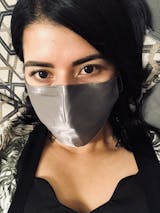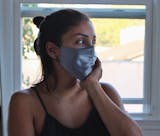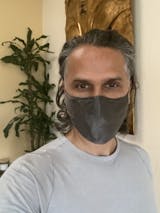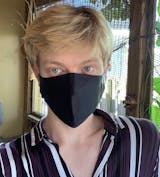You were hoping you'd never have to wear that crappy mask again, weren't you? Me too *eye roll*. What kind of mask have you been wearing? Is it a disposable surgical type mask? Or is it a reusable, washable fabric that you think is most likely made from cotton, but you're not sure because you bought it off Amazon?
We may still need to wear a mask from time to time. Whether due to a mandate from the government, personal choice, or if we're in an Uber.
So do you think it's time you invested in a good quality mask?
This article will discuss the different fabrics masks are made from, what you should look for in masks, and the best material for masks.
Mask Fabrics
There are many fabrics used for making face masks, but today I'm going to talk about these three fabrics:
- Polypropylene
- Cotton
- Silk
Polypropylene Masks
Polypropylene is a plastic made into a woven fabric between 20-25g per square meter in density. Sometimes polystyrene, polycarbonate, polyethylene, or polyester is used instead, but these materials are all plastic.
These masks are to protect medical professionals from airborne germs and bacteria. While it is an unsustainable and non-eco-friendly product, one can see why it's necessary for a medical setting.
The polypropylene masks are tested for five key things to ensure they are standardized and safe for use by medical professionals:
- Bacteria filtration efficiency in vitro (BFE).
- Particle filtration efficiency.
- Breathing resistance.
- Splash resistance.
- Flammability.
While polypropylene masks were initially intended for medical use only, at the start of the pandemic in 2020, the World Health Organization (WHO) guidelines suggested that even the general public wear them to be properly protected from the airborne virus.
Hospitals and medical clinics are equipped and standardized to properly and safely dispose of their contaminated waste, including their masks. But the rest of humanity doesn't seem to have this down, as our planet is littered with disposable face masks. Houston, we have a face mask problem.
When anything made from plastic ends up in our environment, it breaks down, but it won't biodegrade or compost. Instead, the plastic particles become microscopic, contaminating everything, creating millions and billions of microplastic particles.
Microplastics have made their way into our waterways, oceans, and even into our seafood. Polyethylene, polypropylene, and polystyrene are the most common microplastics found in our oceans.
While scientists are still studying the health implications this could cause humans long-term, I can tell you that if a polyethylene container can leach toxic chemicals into our food, I do not want to be indirectly ingesting it through my fish tacos.
Let's now talk about the skin implications of wearing a plastic face mask.
These masks have a coating that stops liquids from infiltrating. So when a synthetic mask sits pressed against your face even for short periods, any moisture, sweat, saliva, and germs cannot escape. This creates a haven for bacteria to grow, which can then cause maskne.
Synthetic materials can also make it more difficult to breathe. You may believe that we shouldn't be able to breathe in masks easily—that's how you stop airborne particles from getting in, right? But that is not entirely true.
While it is true that we don't want the fabric to be too loose, as that can put you at higher risk of inhaling airborne germs. A surgical face mask is unnecessary for the average person dealing with day-to-day activities and keeping their recommended six-foot distance from strangers.
And let's be honest, surgical face masks are ug-ly. They 100% do not match anything you wear unless you are a medical professional at work.
Cotton Masks
Cotton is the next most commonly found fabric used for face masks. The thread count can be as low as 150, like a set of cheap bed sheets you can spit through, or as high as 1600 thread count—think, luxurious Egyptian cotton.
Regardless of the thread count you choose, there are three key issues when using cotton as a fabric. These are:
- Sustainability
- Ethics
- Quality
First of all, harvesting and processing cotton use up a lot of water. We're talking 14 megaliters per one acre of land. In Texas alone, there are five million acres of cotton plantations. And according to WWF, it takes more than 5,283 gallons of water to produce just 2.2 pounds of cotton, which roughly equals one T-shirt and a pair of jeans. That is an insane amount of water.
The second issue is that many cotton plantations are highly unregulated, particularly in developing countries, which means that workers are often victims of exploitation. This also includes child labor. Workers get exposed to dangerous and toxic pesticides in these circumstances, so it's essential to know where cotton is sourced from.
Unless cotton is certified organic—look for a USDA-approved Global Organic Textile Standard (GOTS) label—the fabric has likely come from an unsustainable or unethical source.
The third problem with the cotton industry is that it's hard to tell if the cotton used is high quality unless you know exactly where the fabric has been sourced. High-quality cotton should last a long time and feel soft on the skin. Cheap quality cotton will lose its shape quickly can lose its color even faster.
Always read the label, as often cotton will be a blend of cottons and other materials, like plastic polyester or nylon. As mentioned in our first section, plastic particles are a real problem for the environment and are not ideal for our skin.
When used as a face mask, high-quality cotton is acceptable for the skin. It's breathable and can be washed regularly without it losing its shape. But, cotton masks can still cause maskne, as the fabric can trap bacteria and germs.
One great tip when disposing of old cotton masks is to use them as a cleaning rag rather than throwing them away.
Silk Masks
Now there is silk. One of the world's most beautiful fabrics, often associated with royalty, luxury, and sensuality.
Like cotton, there are different grades and qualities of silk available. The same three issues we face when choosing cotton, we also face with silk.
Let's first start by talking about how silk is made. Silk is a natural protein that comes from silkworms, the larvae of moths. If you weren't sure, this means that silk is not a vegan product. The silk filaments are stretched out into long strands and then spun into silk.
Environmentally speaking, silk is more eco-friendly than cotton as it is a renewable resource. It is biodegradable, antibacterial, and antimicrobial. The silkworms feast on mulberry trees, which don't require pesticides or fertilizers. This also means better conditions for the farmers and surrounding villages, as fewer chemicals pollute the air.
Another great thing about silk is it's naturally wicking and will not tug on the skin. This is why silk pillowcases exist, as they are gentler on skin and hair.
So what about face masks? Well, silk is a superior fabric when it comes to face masks. The antibacterial and antimicrobial properties mean that maskne will be a thing of the past.
Silk is breathable and lightweight and, as mentioned before, won't tug on the skin, so it's comfortable to wear. When your silk mask is no longer wearable, you can dispose of it, and it will eventually biodegrade naturally.
You won't need to worry about ruining your outfit with a silk mask. These stunning masks can level up any outfit, giving it a luxurious and elegant finish.
Best Face Mask
My favorite silk masks are the Fait avec Coeur 100% silk face masks. They come in 18 different colors, so there's one for every occasion. They have adjustable earloops and a filter pocket for additional protection.
Fait avec Coeur is 1% for the planet, which means that a percentage of your purchase will go directly to helping our environment. These are masks you can feel good about wearing.
Fait avec Coeur's silk products are OEKO-TEX®, BSCI, and ISO certified.
Emma Jade has been a trained esthetician for over 15 years. She is a sustainable skincare writer, educating and building awareness around proper skin health that doesn't cost the Earth.
Some of the products promoted in our blog are from our online store. Many others are brands we have researched and found to be great examples of sustainable, ethical, and innovative brands in their field, and we don't profit from mentioning them in our blog. #CollaborationOverCompetition










